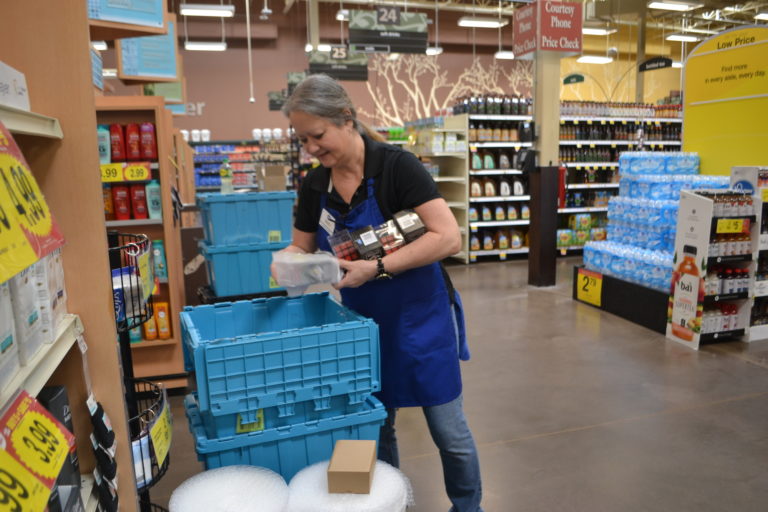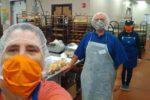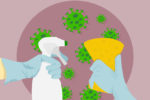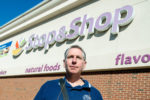
UFCW International President Marc Perrone appeared on MSNBC to speak with Andrea Mitchell about the dire situation faced by America’s grocery workers who are struggling to stay safe while working under challenging conditions during the coronavirus outbreak.
Read the transcript of that conversation below.
[vc_video link=”https://youtu.be/vvSc5NFgzI8″]
ANDREA MITCHELL: Joining me now is the president of the United Food and Commercial Workers International Union, Marc Perrone. His union represents more than a million members. Marc, thank you very much for being with us. What is your main concern about the people working in the grocery stores, working in the drugstores, on the front lines, really?
MARC PERRONE: Well, what concerns us at this point, quite honestly, is the volume of the number of people that are coming into the stores and the exposure that those workers are having. On a normal day, we might look at anywhere from 800 to say 1,200 people, depending on the day. But one day last week in one of our stores in the New York/New Jersey area, there were over 10,000 people in the store that day.
Just the sheer volume of the people that they run into is one of our major concerns. And them not having the protective equipment that they need, much like the doctors and the first responders. Now, we understand that there’s a — what we’ve been told is there’s a shortage, and therefore, we believe that that equipment, of course, needs to go first to the doctors and the nurses and the firefighters and the police.
However, we have looked for alternative ways and we’ve been working with Albertsons and Safeway to put up plexiglass shields, to shield those workers from that close contact. We think that’s going to be a good solution in the short-run, but we do need protective equipment at some point in time when we get enough supplies for everybody that are going to be in the line of fire.
MITCHELL: What percentage, if you know, of grocery store workers in the big chains even have masks?
PERRONE: Well, what we’re finding out is that virtually none of them do. Even if they have their own mask at home, like if they’ve done some drywall work or asbestos work around their house or insulation work, they don’t have those masks. And because the CDC initially said that you should only wear them if you’re sick, I think it gave the impression to the public that if you wore a mask, you were sick. And some of the employers were concerned about their employees having masks on, that the public might think that they were sick, when they really weren’t. So, it has been a challenge.
I think the biggest thing that they could do for our members right now — and that’s one of the reasons why we are asking for first responder status, is so that we can get quick testing and rapid test results so that at least we’d be able to pull anybody out of the stores that had tested positive that were going to be talking to that many people in the public on a day-to-day basis.
And it also would help our co-workers in those stores so that they wouldn’t get sick from interacting with somebody that might have been infected. I think the third thing that we’re looking for that’s very important to us is workers have time off sick pay if they’re impacted by the virus. Now, that’s very different than being infected by it, because we can’t get the testing, and we can’t get the rapid test results.
Many people are, in fact, pulling themselves out of work because they have symptoms. however, they can’t get the test done. and since they can’t get the test done, by the time they’re well and a test can be given to them, the employer says, well, you know, ultimately, we didn’t have a result for you. And so, they’ve pulled themselves out to protect their customers and their co-workers, but they end up having a Catch-22.
MITCHELL: Well, as we both know, for your workers, they don’t qualify for the tests under these current guidelines. You have to have been diagnosed or have been in contact with someone who has been diagnosed to even qualify for a test, and then it’s very hard to get. So it is a catch-22. Marc Perrone, thank you very much. Thanks for speaking out for all of the frontline people working in the grocery stores, helping to keep us all fed and, of course, the drugstores as well.
PERRONE: You know, Andrea, if I may, thank you so much for having me today. and i don’t know if you’re aware of this, but we also represent all of the packing and food processing workers, so that’s the next level of concern.
MITCHELL: Absolutely.
PERRONE: We need to keep this food chain and food supply open because we will, in fact, have panic if we can’t keep that open. Thank you.
MITCHELL: Well, you are so right. Thank you, again.



